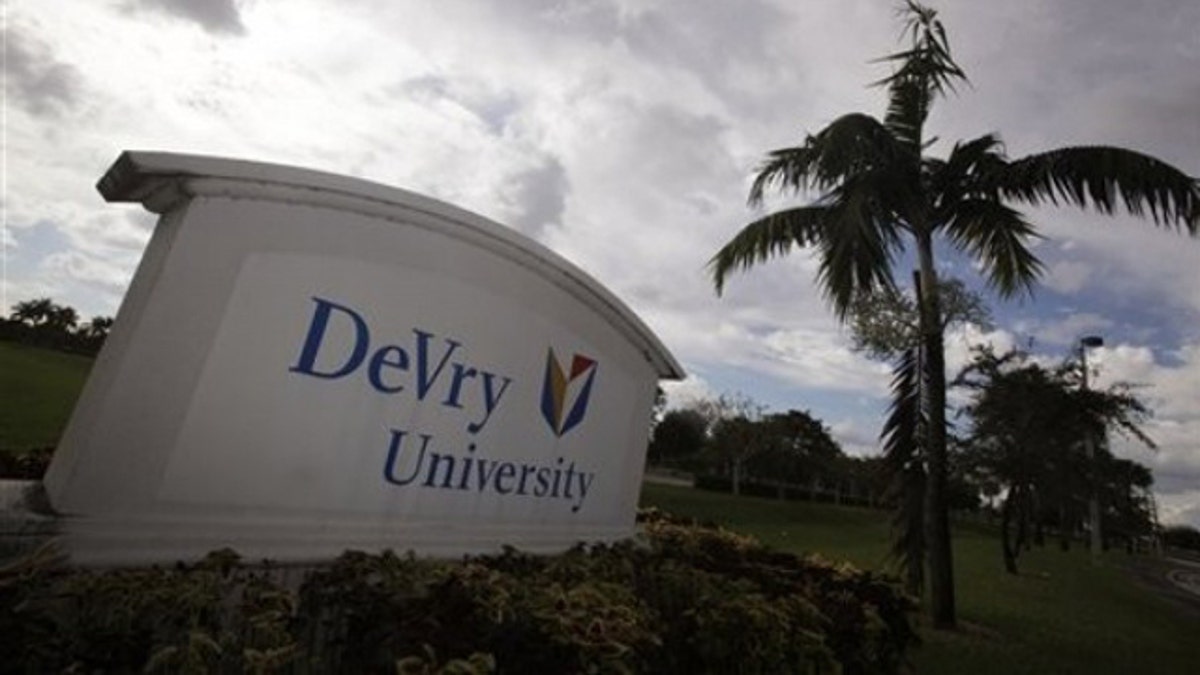
This Nov. 24, 2009 photo, shows the entrance to the DeVry University in Miramar, Fla. (AP)
President Obama's takeover of the student loan industry this year along with his push to boost community college graduation rates have come under fire from for-profit colleges, which say they are being unfairly targeted for cuts in federal spending and overlooked in the effort to improve the country's competitiveness.
For-profit colleges received more than $24 billion in federal loans and grants last year. But the Obama administration is seeking to tighten regulation of the industry which critics say will limit the types of federal loans available to for-profit college students.
At a White House summit Tuesday, Obama met with officials from some of the nation's 1,200 community colleges along with businesses and philanthropies in an effort to boost the schools that provide millions of students with skills training and a less expensive path to a college degree -- even as they're increasingly challenged by climbing enrollments and high dropout rates.
Obama called for community colleges, which he hailed as the "unsung heroes of America's education system," to produce an additional 5 million graduates by 2020.
Missing from the summit were officials from the nation's for-profit colleges, which are under increased scrutiny after a recent undercover government investigation found misleading recruiting tactics.
"Even though the event Tuesday only focused on community colleges, we would have liked to have had a seat at the table," said Harris Miller, president of the Association of Private Sector Colleges and Universities, which represents more than 1,800 members.
He added that he admires Obama for recognizing the country's weakness isn't at the top of the education system.
"Our competitiveness is dropping, not because of elite universities. They're still the best in the world," he said. "Where we're really falling behind is the ability to provide people with associate degrees that are often so necessary to have in a service-based economy."
Miller said the strength of for-profit colleges is meeting that demand when community colleges are badly underfunded by budget-constrained states and forced to spend heavily on remedial education for poorly prepared students.
Justin Hamilton, a spokesman for the Education Department, said the administration believes that "the best for-profit schools will play an important role in helping President Obama to reach his goal in returning America to No. 1 in graduates produced.
"But far too many of these schools are saddling students with debt they can't afford in exchange for degrees and certificates they can't use," he said.
The industry is fighting an Education Department proposal that would cut off aid to vocational programs with high student debt levels and poor loan repayment rates.
Bob Cohen, a spokesman for APSCU, said the proposal is "harmful" to programs and limits choices for students.
Miller called the proposal "absurd" because it uses a formula that he says would disqualify most medical schools if they were included. Further, he says it encourages institutions to manipulate numbers to qualify for the aid even if the program is lousy.
The proposal has "nothing to do with institutional quality," he said. "If it did, it would focus on graduation rates and job placement rates."
Hamilton said the proposal won't limit student choice and protects vulnerable students.
"Nothing would prevent students using federal financial aid from attending a good program that prepares them for gainful employment and helps them get the kind of job they need," he said.
"Our proposal will protect low-income and minority students from being exploited by bad programs and help make sure they can use their federal aid to enroll in an effective program," he said.
Miller said the proposal is "putting literally hundreds of thousand of students at risk." He vowed to advocate against the proposal to the White House and Congress.
"The consumer should decide; not a bureaucrat in Washington," he said.




